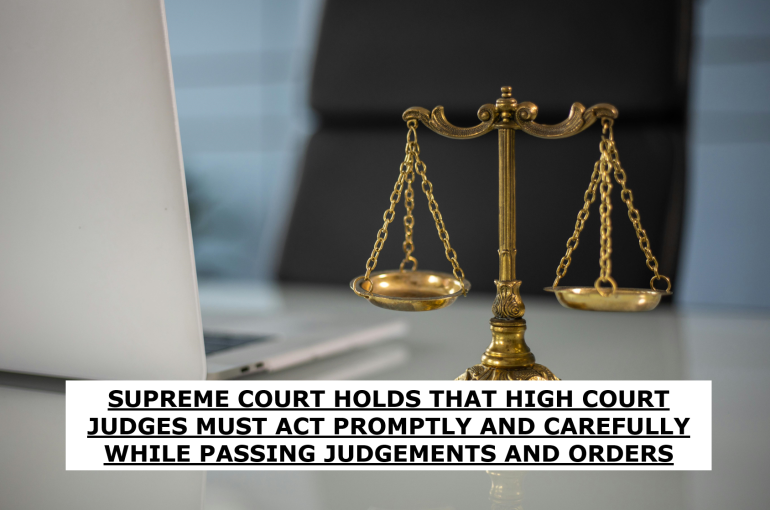SUPREME COURT HOLDS THAT HIGH COURT JUDGES MUST ACT PROMPTLY AND CAREFULLY WHILE PASSING JUDGEMENTS AND ORDERS
A two Judge Bench of the Hon’ble Supreme Court comprising of Justice Dipankar Datta and Justice Prashant Kumar Mishra passed a judgement dated 21.10.2024 in Ratilal Jhaverbhai Parmar and Ors. v. State of Gujarat and Ors. Civil Appeal no. 11000 of 2024 wherein the Apex Court held that it is important for High Court judges to follow the law and act expeditiously while passing orders and judgements because any irregularity could undermine the judiciary’s reputation.
Facts
A petition bearing no. 10912 of 2015 was filed by the Appellant under Article 227 of the Constitution of India (Power of superintendence over all courts by the High Court) in the Gujarat High Court wherein the Appellant challenged the Order dated 16.06.2015 passed by the Deputy Collector, Kamrej Prant, District Surat. During the proceedings before the Gujarat High Court, the Hon’ble Court neither reserved the judgement nor passed any order on conclusion of hearings. Even after 1 year, the said Order was not uploaded on the Website of Gujarat High Court. However, the Counsel for the Appellant received the soft copy of the Order dated 01.03.2023 from the I.T Cell of the High Court containing the reasons for dismissal of the Petition filed by the Appellant.
The Order dated 01.03.2023 passed by the Gujarat High Court was challenged by the Appellant stating serious allegations against the Ld. Judge sitting in the Court. The Appellant contended that no oral Order was passed on 01.03.2023 in the Court and the Ld. Judge just dismissed the Petition without giving the reasons thereof. Moreover, the Appellant contended that the impugned Order was passed a year after 01.03.2023 i.e. in 2024 and was made backdated by the Ld. Judge.
Issues
- Whether an Oral Order was passed in Court on 01.03.2023 by the Hon’ble Court?
- Whether the Judge made a backdated order and uploaded the Order in 2024 only?
Decision by the Supreme Court
The Hon’ble Supreme Court sought for a report from the Registrar General of the High Court as to whether the allegation made by the Appellant that the reasoned order bearing the date 01.03.2023 was communicated to him for the first time on 30.04.2024 was correct or not. Surprisingly, the allegation of the Appellant was found to be correct as the Ld. Judge dictated the impugned Order on 12.04.2024 to his personal secretary, and then the Order was uploaded on the website of the High Court on 30.04.2024 as well as communicated to the Appellant’s Counsel by the IT Cell.
The Apex Court also observed the digital recording of the proceedings held on 01.03.2023 and could conclude that the Ld. Judge just dismissed the Petition in the Court without orally pronouncing the judgement. The Hon’ble Supreme Court held that the reasons for dismissal were recorded and uploaded much later than the actual dismissal date, which violated judicial norms.
The Hon’ble Court relied on the judgement of Balaji Baliram Mupade vs State of Maharashtra (2021) 12 SCC 603 wherein the Apex Court held that-
“1. … Judicial discipline requires promptness in delivery of judgments—an aspect repeatedly emphasised by this Court. The problem is compounded where the result is known but not the reasons. This deprives any aggrieved party of the opportunity to seek further judicial redressal in the next tier of judicial scrutiny.
- We must note with regret that the counsel extended through various judicial pronouncements including the one referred to aforesaid appear to have been ignored, more importantly where oral orders are pronounced. In case of such orders, it is expected that they are either dictated in the court or at least must follow immediately thereafter, to facilitate any aggrieved party to seek redressal from the higher court. The delay in delivery of judgments has been observed to be a violation of Article 21 of the Constitution of India in Anil Rai case [(2001) 7 SCC 318] and as stated aforesaid, the problem gets aggravated when the operative portion is made available early and the reasons follow much later.”
The Apex Court also emphasized on the inappropriate procedure followed by the Ld. Judge by delaying the judgement and ante-dating a judicial Order which is a gross abuse of process of law.
The Hon’ble Supreme Court allowed the Appeal of the Appellant and set aside the High Court Order dated 01.03.2023, and restored the Appellant’s petition, directing the Gujarat High Court to reassign it for prompt and unbiased resolution.
Conclusion
The judgment reflects on the importance of judicial discipline, especially in the timing and communication of orders. The Apex Court stressed that High Courts must abide by precedents and uphold fairness, integrity, and transparency to maintain public trust. This judgment highlights the duty of High Court judges to avoid procedural lapses and act promptly, as any appearance of irregularity risks damaging the judiciary’s credibility. The Supreme Court emphasized that judgments should punctually follow the verdict, as any delays in the orders, obstruct justice, prevent appeals, and may breach rights of citizens under Article 21 of the Constitution.
ARJAV JAIN
ASSOCIATE
THE INDIAN LAWYER & ALLIED SERVICES





































Leave a Reply